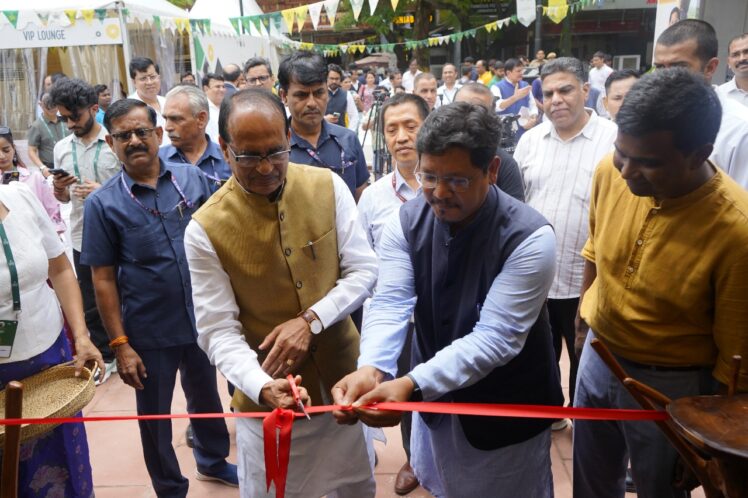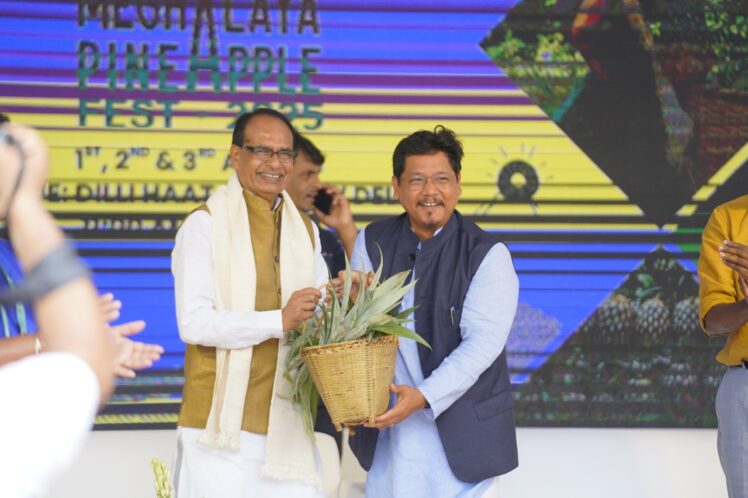
NEW DELHI:
The air in New Delhi was filled with the vibrant fragrance of Meghalaya’s renowned Kew pineapples as the third edition of the Meghalaya Pineapple Festival was officially inaugurated on August 1st at the iconic Dilli Haat. The event, a vibrant celebration of the state’s agricultural success and rich cultural heritage, was graced by Union Agriculture and Rural Development Minister Shivraj Singh Chouhan and Meghalaya Chief Minister Conrad K. Sangma.
A Sweet Endorsement and a Promise of Support
Union Minister Shivraj Singh Chouhan delivered a personal endorsement of Meghalaya’s agricultural produce, declaring that the pineapples from the state are “distinct in terms of taste and quality.” He lauded the state’s farmers and the government for their hard work and “value chain approach” to agriculture. He lauded the Meghalaya government’s efforts, with the Minister admitting he “couldn’t stop eating” the famously juicy and sweet fruit after tasting it.
Airlifting agri produce from Meghalaya
Chouhan also used the platform to announce the central government’s commitment to supporting Meghalaya’s agricultural sector. He highlighted plans for “air lifting” agricultural products from the state to ensure their speedy distribution and mentioned that the option of transporting goods by train would also be explored. He further assured Chief Minister Sangma of the central government’s full support for the state’s development, including a future visit to Meghalaya with a team of scientists to address challenges like increasing the “shelf life” of products. The Minister also urged the public to embrace the organic products from the state.

The Program: A Blueprint for Agricultural Transformation
The inauguration program was more than just a ceremony; it was a strategic event that laid the groundwork for the future of Meghalaya’s agricultural economy. The program’s key elements included:
Signing of Landmark MoUs: A pivotal moment was the signing of three major Memoranda of Understanding (MoUs) between the Government of Meghalaya and prominent national companies: Reliance Fresh, Amazon Karigar, and Blue Tokai Coffee Roasters. These partnerships are designed to scale the procurement, enhance visibility, and expand the national distribution network for Meghalaya’s agri-products.
Unveiling of ‘Meghalaya’s Progress in the Agriculture Sector’ Booklet: The Union Minister officially released a booklet detailing Meghalaya’s achievements in the agricultural sector, aligning with the state’s broader Vision@2032 strategy to become a $16 billion economy. This document outlines a five-year roadmap focused on strengthening farm infrastructure, promoting crop diversification, enhancing processing and logistics, and boosting farmer incomes.

Meanwhile, Chief Minister Conrad K. Sangma spoke about the festival’s growth, noting that “every year it is becoming bigger and better.” He highlighted the festival’s role in providing farmers with “the necessary exposure and the network they require—and truly deserve.” He shared a key statistic: Meghalaya produces around 1.5 lakh metric tonnes of pineapples annually and detailed that these investment are not just for pineapples but for a range of Meghalaya’s produce, including turmeric and black pepper. He further revealed the ambitious goal of establishing one processing unit in each of the state’s 55 blocks to cater to prominent value chains.
Cultural Showcase
The festival’s broader program, which runs until August 3rd, is a fusion of gastronomy and culture. It will feature folk-infused musical performances curated as the sun dipped below the Delhi skyline, India Gate came alive with the powerful performances of Meghalaya’s finest grassroots musicians. The vibrant sounds of the hills met the heart of the nation, as the Chief Minister’s Meghalaya Grassroots Music Project (CM-MGMP) brought soul, rhythm and identity to the ceremonial axis of New Delhi, turning the iconic site into a grand open-air stage celebrating music, culture and community.
The inauguration of the Meghalaya Pineapple Festival-2025 stands as a testament to the state’s commitment to empowering its farmers and leveraging its unique, naturally organic produce to build a robust and globally-connected agri-economy.







